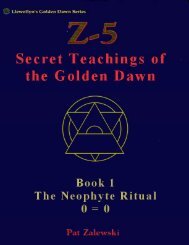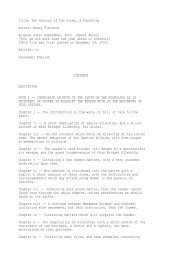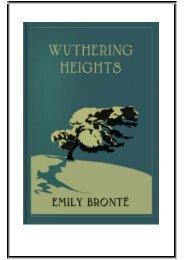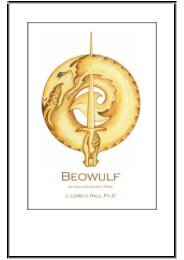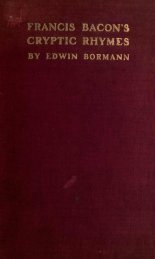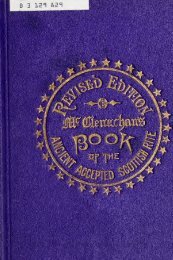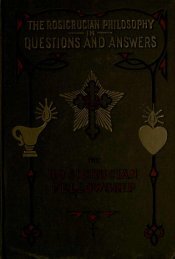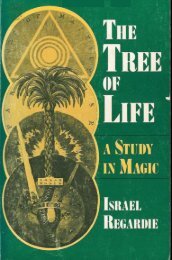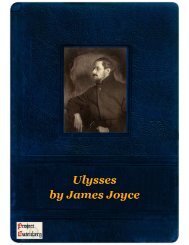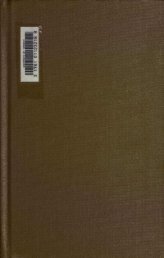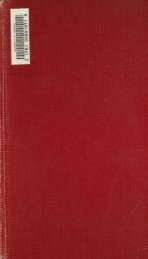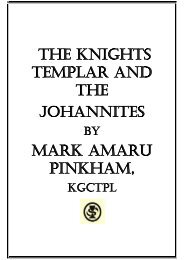Click to download PDF version: 3.87MB - Global Grey
Click to download PDF version: 3.87MB - Global Grey
Click to download PDF version: 3.87MB - Global Grey
Create successful ePaper yourself
Turn your PDF publications into a flip-book with our unique Google optimized e-Paper software.
73 At the Back of the Black Man's Mind By R. E. Dennett<br />
the "Muamba" tree, with the intention of making a fetish, it is forbidden for anyone <strong>to</strong><br />
call another by his name. If he does so, that man will die, and his KULU will enter in<strong>to</strong><br />
the tree and become the presiding spirit of the fetish when made; and the caller will of<br />
course have <strong>to</strong> answer with his life <strong>to</strong> the relations of the man whose life has been thus<br />
wan<strong>to</strong>nly thrown away. So, generally speaking, a palaver is held, and it is there decided<br />
whose KULU it is that is <strong>to</strong> enter in<strong>to</strong> the Muamba tree and <strong>to</strong> preside over the fetish <strong>to</strong><br />
be made. A boy of great spirit, or else, above all, a great and daring hunter, is chosen.<br />
Then they go in<strong>to</strong> the bush and call his name. The Nganga cuts down the tree, and blood<br />
is said <strong>to</strong> gush forth. A fowl is killed and its blood mingled with the blood that they say<br />
comes from the tree. The named one then dies, certainly within ten days. His life has<br />
been sacrificed for what the Zinganga consider the welfare of the people. They say that<br />
the named one never fails <strong>to</strong> die-and they repudiate all idea of his being poisoned or<br />
that his death is hurried on in any material way by the Nganga, who, they say, may be<br />
miles away. The difference between the spirit of "Mpumbu" brought by the East Wind<br />
and the Kulu of the known individual that is <strong>to</strong> preside over this fetish is evident.<br />
People pass before these fetishes (ZINKICI MBOWU), calling on them <strong>to</strong> kill them if they<br />
do, or have done, such and such a thing. Others go <strong>to</strong> them and insist upon their killing<br />
so and so who has done or is about <strong>to</strong> do them some fearful injury. And as they swear or<br />
make their demand, a nail is driven in<strong>to</strong> the fetish, and the palaver is settled so far as<br />
they are concerned. The KULU of the man whose life was sacrificed upon the cutting of<br />
the tree sees <strong>to</strong> the rest.<br />
These fetishes attended big palavers and were knocked39 by the parties engaged, so that<br />
he who spoke falsely or bore false witness should die. These are the class of fetishes<br />
most in evidence, and as such are apparently the bitter enemies of European<br />
Governments, who seem <strong>to</strong> take a delight in clearing the country of them. I wonder if<br />
they are right?-at any rate before they have got the country properly in hand and can<br />
give the inhabitants that security they are so fond of talking about. Brute force is no<br />
doubt a great power for a European Power <strong>to</strong> wield over such a race as the BANTU, and<br />
will make them do much; but is it not curious that civilised countries in the twentieth<br />
century should resort <strong>to</strong> so barbarous a form of governing a people supposed <strong>to</strong> be so<br />
much their moral inferiors? And by taking away a fetish of this kind they do not prevent<br />
the native from making another one <strong>to</strong> take its place. It merely makes the native more<br />
cautious, and forces him <strong>to</strong> guard his fetish in some secret place outside the small<br />
sphere of official influence.'<br />
The wooden figures in this class of NKICI MBOWU are legion, and their multiplication<br />
comes (1) from the desire of each district <strong>to</strong> have its own nkici, and (2) from the<br />
importation from foreign districts of those who have gained fame for their slaying<br />
powers or as deterrents. Thus in Luango we hear of Mangarka, 40 Mbiali Mundunbi,<br />
39 See Ante, P. 56<br />
40 MANGARKA, see Manchester Museum, Mani mavungu, see African Society's Journal, July, 1902.<br />
www.globalgrey.co.uk



